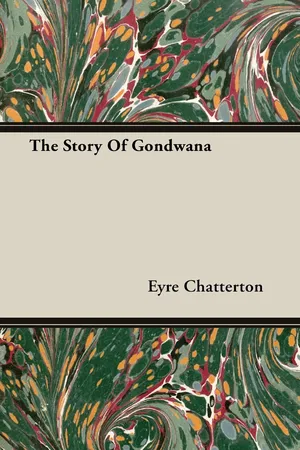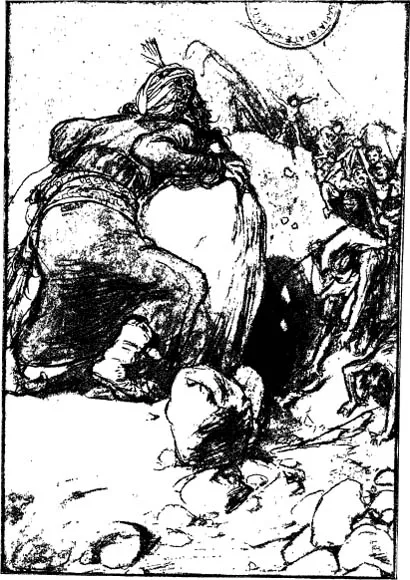
- 272 pages
- English
- ePUB (mobile friendly)
- Available on iOS & Android
eBook - ePub
The Story Of Gondwana
About this book
Originally published in 1916. This little book briefly tells the story of Gondwana, the modern Central Provinces of India. The author felt that, after thirteen years of seeing the old monuments and fortresses, reading bits of its history in Government Gazetteers, someone should piece these scattered records together in something resembling a connected story. And so this is what Eyre Chatterton, the Bishop of Nagpur, did. Author: Eyre Chatterton,D.D. Language: English Keywords: History / India Many of the earliest books, particularly those dating back to the 1900s and before, are now extremely scarce and increasingly expensive. Obscure Press are republishing these classic works in affordable, high quality, modern editions, using the original text and artwork.
Frequently asked questions
Yes, you can cancel anytime from the Subscription tab in your account settings on the Perlego website. Your subscription will stay active until the end of your current billing period. Learn how to cancel your subscription.
No, books cannot be downloaded as external files, such as PDFs, for use outside of Perlego. However, you can download books within the Perlego app for offline reading on mobile or tablet. Learn more here.
Perlego offers two plans: Essential and Complete
- Essential is ideal for learners and professionals who enjoy exploring a wide range of subjects. Access the Essential Library with 800,000+ trusted titles and best-sellers across business, personal growth, and the humanities. Includes unlimited reading time and Standard Read Aloud voice.
- Complete: Perfect for advanced learners and researchers needing full, unrestricted access. Unlock 1.4M+ books across hundreds of subjects, including academic and specialized titles. The Complete Plan also includes advanced features like Premium Read Aloud and Research Assistant.
We are an online textbook subscription service, where you can get access to an entire online library for less than the price of a single book per month. With over 1 million books across 1000+ topics, we’ve got you covered! Learn more here.
Look out for the read-aloud symbol on your next book to see if you can listen to it. The read-aloud tool reads text aloud for you, highlighting the text as it is being read. You can pause it, speed it up and slow it down. Learn more here.
Yes! You can use the Perlego app on both iOS or Android devices to read anytime, anywhere — even offline. Perfect for commutes or when you’re on the go.
Please note we cannot support devices running on iOS 13 and Android 7 or earlier. Learn more about using the app.
Please note we cannot support devices running on iOS 13 and Android 7 or earlier. Learn more about using the app.
Yes, you can access The Story Of Gondwana by Eyre Chatterton in PDF and/or ePUB format, as well as other popular books in History & Chinese History. We have over one million books available in our catalogue for you to explore.
Information
PART I
THE CREATION OF THE GOND PEOPLE AND THEIR SUBSEQUENT BONDAGE
THE history opens in the silence and solitude of the glens of the seven hills, which are clearly the Satpura Mountains of the Central Provinces.
In the midst of twelve hills, in the glens of seven hills, is Lingan, or Mount Lingana.
In the Mount is a flower tree named Dăti. Thence for twelve leagues (kôss) there are no dwellers.
Caw says there is no crow, chirp says there is no bird, roar says there is no tiger.
Then follows a weird passage (in which Hindu ideas are clearly predominant), which describes the process by which the Gond people were created.
The god Mahadeva performs an act of penance (tăp) which lasts for twelve months. At the end of the period, one, Kalia Adao, the Divine Ancestor of the Gonds, is born “from a boil in Mahadeva’s hand.” Kalia Adao in his turn performs an act of penance (tăp), and from a boil in his own hand sixteen daughters are born. He is bitterly disappointed. Daughters are regarded by him, as by so many Indians, as by no means a blessing.
“What! Why are these daughters born? I shall have cause to cast my head down. When shall I bring husbands for them?”
He took hold of them, and threw them in the water. After throwing them into it the water dried up, and sixteen sorts of earth were produced.
After this rather drastic way of disposing of his sixteen daughters who, the Pardhan explained to Hislop, were goddesses from whose remains the several soils known to Gonds were made (black cotton, reddish earth, sandy ground, murrum, gravel, etc.), Kalia Adao began a second penance (tăp). On this occasion he was more successful. From it “twelve threshing-floors of Gondi gods were born.” These are the ancestors of the Gond race.
Then follows an amusing description of the wild Gonds in their primitive state. Ignorant, dirty, madly fond of sport, they incur the displeasure of the great god Mahadeva, who, by an ingenious and most ungod-like trick, lures them, like the Pied Piper of Hamlin, into a vast cave, where they are incarcerated. A giant Bhasmasur stands guard over it. Four Gonds, however, more slow of foot than their brethren, remain outside. Parvati, the wife of Mahadeva and a lover of the Gonds, is in deep distress at their disappearance. She commences an act of devotion (tăp) and at the end of it the high god, Bhagawan, says that he will again make her Gonds visible.
Twelve threshing-floors1 of Gondi gods2 were born.
Hither and thither all the Gonds were scattered in the jungle.
Places, hills, and valleys, were filled with these Gonds.
Even trees had their Gonds. How did the Gonds conduct themselves?
Whatever came across them they must needs kill and eat it.
They made no distinction. If they saw a jackal they killed and ate it.
No distinction was observed; they respected not antelope, sambhar, and the like.
They made no distinction in eating a sow, a quail, a pigeon, a crow, a kite, an adjutant, a vulture:
A lizard, a frog, a beetle, a cow, a calf, a he- and she-buffalo:
Rats, bandicoots, squirrels—all these they killed and ate.
So began the Gonds to do. They devoured raw and ripe things.
They did not bathe for six months together.
They did not wash their faces properly, even on dung-hills they would fall down and remain.
Such were the Gonds born in the beginning. A smell was spread over the jungle.
When the Gonds were thus disorderly behaved: they became disagreeable to Mahadeva.

EPIC OF LINGO—“THE SQUIRREL RAN AND THEY PURSUED IT”
Who said, “The caste of the Gonds is very bad.
“I will not preserve them; they will ruin my hill Dhawalagiri.
“I perceive here and there smells.” So said Mahadeva. “Call the Gonds.”
So said he to Narayan. He went, and called them.
And brought them into the presence of Mahadeva.
When they were standing Mahadeva arose and looked and saw all the Gonds come.
He spoke within himself, and took them away into his valley.
He made them to sit in a line, and he sat at the head of them.
He took substance from his own body, and made it into a squirrel.
Thus he made a squirrel while bathing, and gave it life.
When he made it alive, he caused it to run away.
With its upright tail the squirrel ran from the midst of them.
The Gonds saw it running, and they pursued it.
As the Gonds were pursuing it, some said, “Kill it, kill it!”
Another said, “Catch it; it will serve as a nice roast.”
So saying some seized a stick, some a stone.
Some seized a clod; their waist-cloths were shaking; their hair began to fly about.
The squirrel entered a hole, which was the god’s prison on earth.
The Gonds also followed it up to the hole.
All the threshing-floor1 Gonds ran into the cave.
Thus all the Gonds ran; the rest, four2 in number, remained behind.
They came to Parvati; she was sleeping. In the meantime she awoke. She cared for the Gonds. She said, “For many days I have not seen my Gonds.
“There used to be noise in mount Dhawalagiri.
“But to-day there is silence. For many days there has been a smell (of Gonds).
“But to-day I perceive no smell.
“They must have gone somewhere.
“Mahadeva is not to be seen, where did he lead them?” Thus said Parvati.
She ascended Dhawalagiri, and saw no Gonds. Then she said to Mahadeva, “My Gonds do not appear, where have they gone?”
Mahadeva arose and placed a stone sixteen cubits long at the entrance of the cave, and thus shut in the Gonds.
He stationed Bhasmasur,3 a giant, to guard it. Still Parvati remained asking after them.
Then said Mahadeva, “Dhawalagiri began to be odorous, and I fell into a rage thereat.
“But four Gonds have survived, and they are fled.” So said he.
Then Parvati thought in her mind, “My Gonds are lost.”
The four Gonds who fled travelled onward over hills.
Thence they went and saw a tree rising upright, as Date tree.
Which they climbed, and looked about them.
They said, “There is no hiding place visible for us.”
But one of them looked and saw a place named Kachikopa1 Lahugad.
They went by the jungle road and reached that place.
There the four brothers remained.
When the Gonds were not to be found, Parvati began to feel regret for them.
She then commenced a devotion (tăp).
Six months passed.
Parvati ended her tăp. Bhagawan2 (god) meanwhile was swinging in a swing.
He said, “What devotee at my resting time has begun a devotion?
“Narayan, go and see to it.”
Naraya...
Table of contents
- Cover
- Half title
- Title
- Foreword
- Author’s Preface
- Dedication
- Contents
- I. Old Gondwana
- II. Garha and the Northern Gond Kingdom
- III. Chauragarh and the Northern Gond Kingdom
- IV. Hirde Shah and the Pedigree of the Gond Kings of Garha-Mandla
- V. Deogarh and the Eastern Middle Gond Kingdom
- VI. Kherla and the Western Middle Gond Kingdom
- VII. The Southern Gond Kingdom
- VIII. Chanda and the Southern Gond Kingdom
- IX. Nagpur—The Maratha Period (1743-1853)
- X. A Plea for the Old John Company
- XI. Gondwana Under British Rule—Early Days
- XII. Gondwana Under British Rule
- XIII. Some Strange Beliefs and Customs in Gondwana
- XIV. A Few Words On Mission Work in Gondwana
- XV. The Story of Lingo—
- Part I. The Creation of the Gond People and Their Subsequent Bondage
- Part II. The Birth, Life, and Death of Lingo
- Part III. The Revival of Lingo, and His Delivery of the Gonds from Bondage
- Part IV. The Sub-Division of the Gonds into Tribes—The Institution of Worship—The Passing of Lingo
- Index